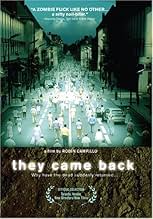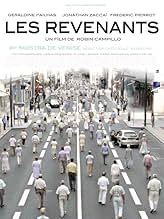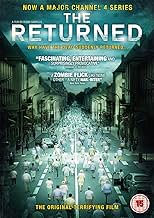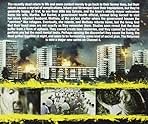IMDb-BEWERTUNG
5,8/10
3044
IHRE BEWERTUNG
Füge eine Handlung in deiner Sprache hinzuThe lives of the residents of a small French town are changed when thousands of the recently dead inexplicably come back to life and try to integrate themselves into society that has changed... Alles lesenThe lives of the residents of a small French town are changed when thousands of the recently dead inexplicably come back to life and try to integrate themselves into society that has changed for them.The lives of the residents of a small French town are changed when thousands of the recently dead inexplicably come back to life and try to integrate themselves into society that has changed for them.
- Regie
- Drehbuch
- Hauptbesetzung
- Auszeichnungen
- 2 Gewinne & 5 Nominierungen insgesamt
Empfohlene Bewertungen
I liked this film, but potential genre viewers beware, this is a subtitled French film, but since I enjoy both horror films and art house movies I had little problem with its leisurely pacing. Some reviewers have commented on a lack of horror, this is true, but there are plenty of unsettling scenes and the film has a genuine sense of unease hanging over it. It takes place in a high-rise suburb of the Ile-de-France, a region of Paris. There is something of a J.G. Ballard-like feel of dislocation to the urban surroundings that matches the inability of the returned dead to fit in with the lives of their previously grieving loved ones. Similarly, as in the short story The Monkey's Paw, it is perhaps better not to have your loved ones return from the dead because they may not be quite as you'd like them to be.
It's a fascinating premise and goes to show how the zombie genre can be tweaked in to interesting new shapes. However, writer and first time director Robin Compillo does not explore the full socio-economic possibilities of the situation, let alone the potential for horror. He instead considers some of the emotional implications involved in regard to loss and wish fulfilment in relation to the returned loved ones. It might be hoped that They Came Back could kick start a new direction in the zombie genre, as a global phenomenon there are thousands of potential scenarios. However, it is unlikely this modest and thoughtful little chiller (imagine M.Night Shyamalan when he was modest and thoughtful) will have the same impact as Night of the Living Dead.
It's a fascinating premise and goes to show how the zombie genre can be tweaked in to interesting new shapes. However, writer and first time director Robin Compillo does not explore the full socio-economic possibilities of the situation, let alone the potential for horror. He instead considers some of the emotional implications involved in regard to loss and wish fulfilment in relation to the returned loved ones. It might be hoped that They Came Back could kick start a new direction in the zombie genre, as a global phenomenon there are thousands of potential scenarios. However, it is unlikely this modest and thoughtful little chiller (imagine M.Night Shyamalan when he was modest and thoughtful) will have the same impact as Night of the Living Dead.
I'll admit, Campillo's "Les Revenants" is several artistic steps below (and two hours shorter than) any Tarkovsky epic. But as I watched the film, I couldn't get Tarkovsky's original "Solaris" out of my mind. The two films share a kind of somnambulist's sadness, a lumbering quality of going nowhere slowly, a dreaminess that falls somewhere between irritating nightmare and ho-hum sexdream. Oh, and both movies are populated with previously dead people, of course.
"Solaris" and "Les Revenants" pose similar questions as well: Are we dealing with actual "returnees," or are we simply struggling with the very palpable memories of those who have passed on? (Think about how "empty" the zombies are in both films and how they just sort of fade away--physically or spiritually--in both films.) Are these returnees dangerous to us? Or are we simply harming ourselves? More poignant, are WE the actual zombies? Hmmmm, hard to say. The film doesn't offer up any easy answers either as we see the crypt-dwellers attempting to return to their lives in the little French village as if things were...just fine.
And regarding the lack of answers, we also never find out what it was like to actually be dead either. If anything annoyed me about Campillo's "avant zombie flick," it's that. I kept waiting, wondering, would someone finally ask their deceased relative or returnee-loved-one lounging in bed next to them: "So, what's the afterlife like exactly? I mean, did that coffin get cramped? Did lying in the ground for ten years get irritating? Did you ever get the urge to roll over but didn't have enough room to maneuver? Would you choose cremation next time around, or would you just take a battery-powered TV with you into your grave next time?" But none of those topics ever came up. Of course, such a conversation really wouldn't have fit the arty tenor of the movie anyway.
But COME ON! ADMIT IT! These are precisely the weighty issues we want to hear about from experienced dead folks, right? I mean if you are having a picnic with a zombie (and YOU aren't the picnic, that is) you're gonna ask. You know you would.
I realize it is unlikely this movie would exist if it weren't for the wonderful Romero and his ilk. But overall, I offer a hearty kudos to Campillo for breathing life into the long-dead zombie subgenre. There are SO MANY zombie films out there (they seem to appear weekly), and I admit that I grew up digesting many of those Italian, German, and English delights. But with age and experience, you eventually tire of fast food, and you realize that the next "Zombie Intestine Massacre" flick is simply and mindlessly repeating itself so that every SPFX guy on the studio lot can keep his or her job. That's fine. But kiddies looking for gut-munching scenes will find none here--let them go elsewhere and leave the adults in peace.
"Solaris" and "Les Revenants" pose similar questions as well: Are we dealing with actual "returnees," or are we simply struggling with the very palpable memories of those who have passed on? (Think about how "empty" the zombies are in both films and how they just sort of fade away--physically or spiritually--in both films.) Are these returnees dangerous to us? Or are we simply harming ourselves? More poignant, are WE the actual zombies? Hmmmm, hard to say. The film doesn't offer up any easy answers either as we see the crypt-dwellers attempting to return to their lives in the little French village as if things were...just fine.
And regarding the lack of answers, we also never find out what it was like to actually be dead either. If anything annoyed me about Campillo's "avant zombie flick," it's that. I kept waiting, wondering, would someone finally ask their deceased relative or returnee-loved-one lounging in bed next to them: "So, what's the afterlife like exactly? I mean, did that coffin get cramped? Did lying in the ground for ten years get irritating? Did you ever get the urge to roll over but didn't have enough room to maneuver? Would you choose cremation next time around, or would you just take a battery-powered TV with you into your grave next time?" But none of those topics ever came up. Of course, such a conversation really wouldn't have fit the arty tenor of the movie anyway.
But COME ON! ADMIT IT! These are precisely the weighty issues we want to hear about from experienced dead folks, right? I mean if you are having a picnic with a zombie (and YOU aren't the picnic, that is) you're gonna ask. You know you would.
I realize it is unlikely this movie would exist if it weren't for the wonderful Romero and his ilk. But overall, I offer a hearty kudos to Campillo for breathing life into the long-dead zombie subgenre. There are SO MANY zombie films out there (they seem to appear weekly), and I admit that I grew up digesting many of those Italian, German, and English delights. But with age and experience, you eventually tire of fast food, and you realize that the next "Zombie Intestine Massacre" flick is simply and mindlessly repeating itself so that every SPFX guy on the studio lot can keep his or her job. That's fine. But kiddies looking for gut-munching scenes will find none here--let them go elsewhere and leave the adults in peace.
This film stirs a few emotional quandaries, many of which a viewer may choose not to explore. If the purpose of film is to generate thought and reflection as much as to entertain, 'Les Revenants' succeeds by virtue of it's creepy essence and the personal and social problems we'd encounter as individuals if faced with the reality of having our dead loved ones come back to us. The subject is handled cleverly and touchingly by the director who never attempts to drive our view but allows the characters to help us define our feelings. Particularly perplexing for a parent who might give just about anything to see their fallen child again. The misty night scenes, serene almost drugged manner with which the dead carry themselves and the evolution of divided feelings regarding their return by the living give the film an ethereal pace which may disappoint flesh hungry zombie fans.
After I realized this movie is not a horror or a trash one, just because it has zombies in its plot I thought it has a great creative mind behind the story; however, when the movie ended I felt there was something missing in the story. The movie does not care much about explaining its core issue that is about the coming of the dead people themselves. Why did they return to live if all they want is to go to the tunnels? It does not say where the tunnels will lead them. To heaven or to hell? to the Elygian fields? to Mars? or to some new dimension? I would not bother if the movie was longer just to explain this part carefully. If so,the movie would be brilliant. Unfortunately it is not a brilliant movie. It is only good to make us think about the crazy hypothesis that the movie is talking about, which is, at least, interesting. My note is to say that according to my own interpretations, the movie never tries to sound funny as some other critics say, but tragic and hypothetical. People are never prepared to welcome their dead relatives with eager if they knock at their door after some years of "absence", even if you love them so much.
Well, anyone who's been to a 'zombie' movie knows that nothing good can come from bringing the dead back to life, but director Robin Campillo presents a more interesting dilemma. How would a society accommodate and re-integrate their loved ones and relatives if they suddenly came walking out of the cemetery with clean clothes, no illnesses, and energy to spare.
What director Campillo has done is replaced 'scary' with 'eerie' as a local government struggles to shelter and re-located hundreds of the town's former inhabitants. In addition, the town's mayor must decide whether people can return to their old jobs, their old lives, or whether they should be studied to determine how all this came about.
Film takes a very matter-of-fact approach to sifting through a population influx, much like having a large group of refugees arrive in your town. The local scientists do make some early discoveries involving reduced sleep patterns, lower body, temperature, and how these 'arrivals' may only be acting normal as memory response.
If you enjoyed last year's "Time Out" (which Campillo co-wrote), then you'll also appreciate this spooky, but 'non-flesh eating', dead people coming back to life cinema experience. In some ways having your ex-wife come back can be scarier than a zombie, eh guys?
What director Campillo has done is replaced 'scary' with 'eerie' as a local government struggles to shelter and re-located hundreds of the town's former inhabitants. In addition, the town's mayor must decide whether people can return to their old jobs, their old lives, or whether they should be studied to determine how all this came about.
Film takes a very matter-of-fact approach to sifting through a population influx, much like having a large group of refugees arrive in your town. The local scientists do make some early discoveries involving reduced sleep patterns, lower body, temperature, and how these 'arrivals' may only be acting normal as memory response.
If you enjoyed last year's "Time Out" (which Campillo co-wrote), then you'll also appreciate this spooky, but 'non-flesh eating', dead people coming back to life cinema experience. In some ways having your ex-wife come back can be scarier than a zombie, eh guys?
Wusstest du schon
- WissenswertesFrédéric Pierrot, who plays Gardet, also appears in the 2012 TV series The Returned (2012) as the character Jerome.
- VerbindungenRemade as The Returned (2012)
Top-Auswahl
Melde dich zum Bewerten an und greife auf die Watchlist für personalisierte Empfehlungen zu.
- How long is They Came Back?Powered by Alexa
Details
Zu dieser Seite beitragen
Bearbeitung vorschlagen oder fehlenden Inhalt hinzufügen
























